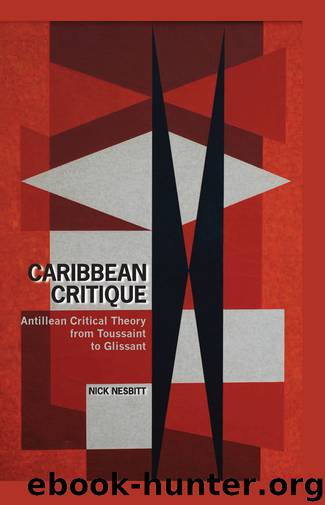Caribbean Critique by Nesbitt Nick;

Author:Nesbitt, Nick;
Language: eng
Format: epub
Publisher: Liverpool University Press
CHAPTER SEVEN
The Baron de Vastey and the Contradictions of Scribal Critique
As scholars, including Laurent Dubois and myself, have argued, it was revolutionary Saint-Domingue that remained faithful to the Jacobin ideals of liberty, equality, and fraternity in the wake of Thermidor and the rise of Napoleon and his administration’s ever-increasing determination to reimpose slavery upon the peripheral French colony. The events of the Haitian Revolution, Dubois writes, were ‘the most concrete expression of the idea that the rights proclaimed in France’s 1789 Declaration of the Rights of Man and Citizen were indeed universal’ (Dubois 2004: 3). Following the defeat of the French and the declaration of Haitian independence on January 1, 1804, however, this revolutionary project of universal emancipation and transnational abolitionism was immediately placed in a paradoxical double-bind.
Sibylle Fischer has described in vivid terms the ‘extraordinary challenges the new state was facing in a world where slave-holding was the rule’ (Fischer 2004: 227). Indeed, across the Atlantic zone of economies still fundamentally dependent upon slave-based plantation labor for the extraction of surplus profit, Haiti’s mere existence as a slavery-free state was immensely threatening, and neither France nor the United States would extend diplomatic recognition to it for decades to come. As Deborah Jenson has shown in great detail (Jenson 2011: 81–224), France actively plotted to reinvade Haiti from the moment of its shocking defeat in 1804 through its eventual extortion of diplomatic recognition in 1825. Following the Bourbon restoration in April 1814, France made ever-increasing threats to reconquer Haiti with a new military invasion in order to reaffirm its hegemony over the territory and to reconstitute plantation slavery, as it had in Guadeloupe and Martinique in 1802 In this context, the fragile and isolated young Haitian state was forced to retract any and all claims to export antislavery beyond its borders. It did so in order merely to consolidate and preserve the limited, if world-historical, accomplishments of the revolution itself, in order, that is to say, to dissuade the Atlantic powers from re-invading in the aim of reimposing plantation slavery.1
In Modernity Disavowed, Fischer brilliantly decodes the working through of this paradox of Haitian independence in the dialectic between the explicit anti-intervention clauses in the young state’s various constitutions and their more or less implicit, subversive offers of a post-racial citizenship to the Atlantic African diaspora.2 The writings of Henry Christophe’s famous scribe and incipient postcolonial theorist the Baron de Vastey, I wish to argue in what follows, are not only another privileged site of response to this direct and very real threat the young country faced, but remain subject to contradictions analogous to those Fischer identifies in the various Haitian constitutions. Indeed, Vastey himself explicitly reiterates similar assurances of non-intervention in his writings. In his 1817 Réflexions politiques, for instance, he describes Christophe’s Haitian state in idyllic terms that predicate this will to insularity upon Haitian’s social contentment:
happy and satisfied to live in peace on our island, content with the destiny the master of the universe has laid forth for
Download
This site does not store any files on its server. We only index and link to content provided by other sites. Please contact the content providers to delete copyright contents if any and email us, we'll remove relevant links or contents immediately.
| African | Asian |
| Australian & Oceanian | Canadian |
| Caribbean & Latin American | European |
| Jewish | Middle Eastern |
| Russian | United States |
4 3 2 1: A Novel by Paul Auster(11045)
The handmaid's tale by Margaret Atwood(6850)
Giovanni's Room by James Baldwin(5876)
Big Magic: Creative Living Beyond Fear by Elizabeth Gilbert(4721)
Asking the Right Questions: A Guide to Critical Thinking by M. Neil Browne & Stuart M. Keeley(4573)
On Writing A Memoir of the Craft by Stephen King(4212)
Ego Is the Enemy by Ryan Holiday(3989)
Ken Follett - World without end by Ken Follett(3972)
The Body: A Guide for Occupants by Bill Bryson(3797)
Bluets by Maggie Nelson(3707)
Adulting by Kelly Williams Brown(3667)
Guilty Pleasures by Laurell K Hamilton(3585)
Eat That Frog! by Brian Tracy(3512)
White Noise - A Novel by Don DeLillo(3434)
The Poetry of Pablo Neruda by Pablo Neruda(3364)
Alive: The Story of the Andes Survivors by Piers Paul Read(3309)
The Bookshop by Penelope Fitzgerald(3225)
The Book of Joy by Dalai Lama(3215)
Fingerprints of the Gods by Graham Hancock(3210)
